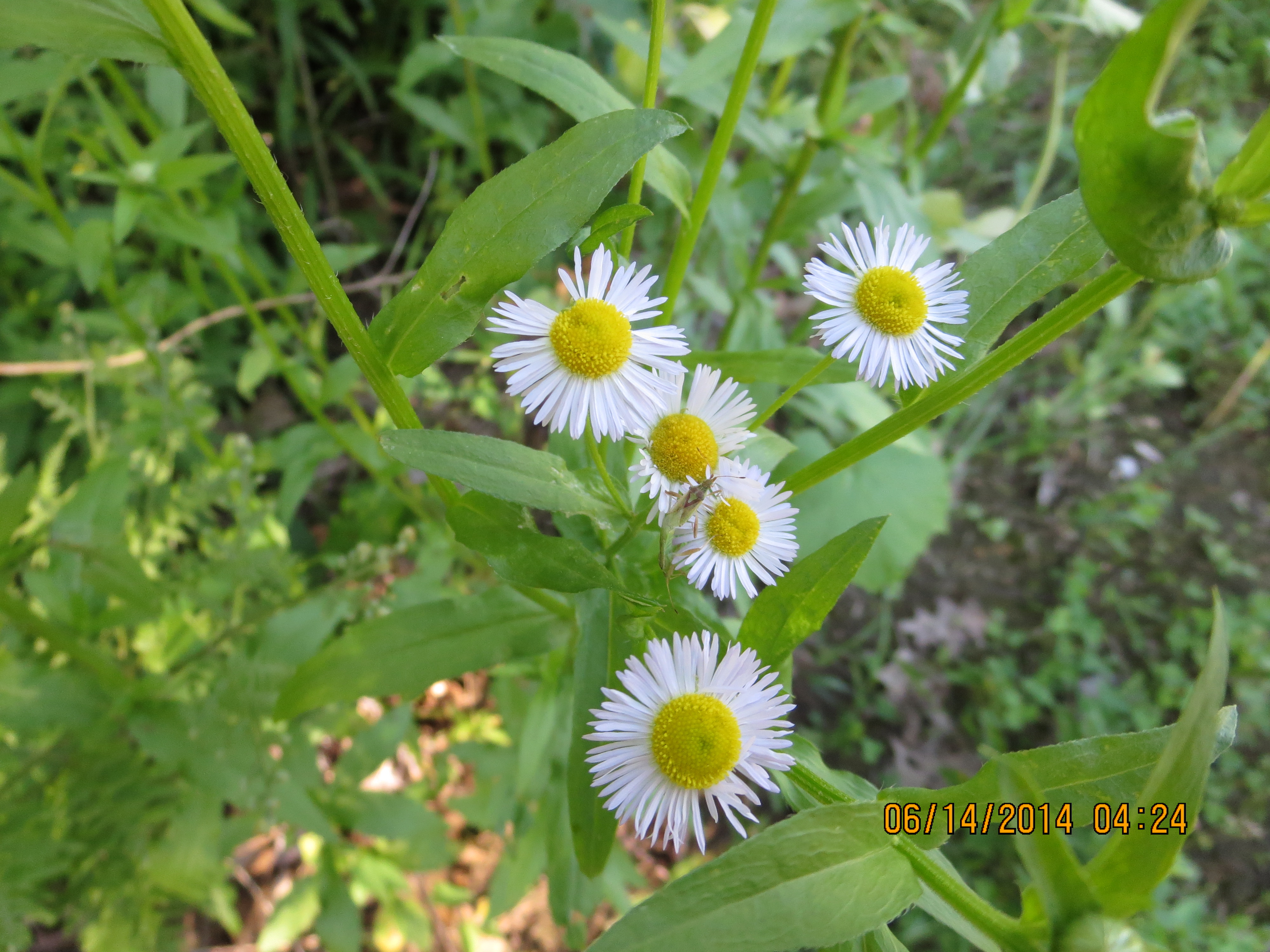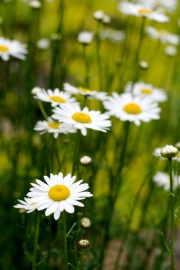| Pink Evening Primrose |
| milkweed |
 |
| Daisy Fleabane |
| Black-Eyed Susan |
 |
| Oxeye Daisy |
 |
| Blue Cornflower |
 |
| Loostrife or Lythrum |
|
Flowers or weeds? I guess it is in the eye of the beholder. I admit that I let these untamable wildflowers grow in my garden despite the fact
some gardeners consider them obnoxious, invasive, and undesirable weeds.
I've
been warned to dig them out by the root before they have a chance to, horror upon horror, take
'hold' and edge out more desirable specimens like roses and hydrangeas.
|
Not, of course, that there is anything wrong with roses and hydrangeas. Indeed, if you were to ask my favorite flower, I would say it is whatever is in bloom.
Now, stick with me here as I go through a rather convoluted theory about how gardening can relate to writing. It came to me yesterday as I was working outside.
Imagine each flower as a person in your story. That each bloom is a character both unique or stereotypical. It's undeniable that plants possess their own strengths and weaknesses much as we do. Some are aggressive and try to take over the bed. Some are delicate and temperamental. Some are bold and some dainty.
Others, like the hybridized rose, might create a gorgeous and showy splash of color but they've lost that original, deeply haunting, and sweet scent in the process. They put me in mind of the handsome or lovely character that
is all surface charm with no inner substance.
Can't you see children or childish characters in the tiny daisy fleabane? Milkweed is
maternal. Attracting butterflies
like a magnet and essential to the Monarch's diet, milkweed is the comfortable, older woman. Sweetly pink or butter yellow Primrose is the secondary female lead. This character is usually the heroine's best friend. On the other hand, you have to see that purple lythrum is the male best friend.
Or do plants radiate gender to you as they do me?
That's why I see the Black-eyed Susan or Oxeyed daisies as great heroines. They're plucky, fun, cute, and bright all at the same time. While the masculine blue cornflower is perfect as the hunky, strong, and brave hero.
The thought makes me shiver just as much as when suspense drives the plot.
Even among the flora, there are few bad flowers. Queen Anne's lace tops my list as an undesirable. I didn't realize I was allergic to the intricately woven bloom until the summer of snot. That was the year it grew along the fence line and my little sweeties lovingly brought me a stem or two each day. I, in turn, dutifully placed them in vases around the house. And sneezed my head off as my nose ran and ran and ran.
It's embarrassing to say how long it took me to figure out the cause of my 'summer cold'. It goes to show that Queen Anne's lace is the epitome of a complex character. Pleasant and interesting to look at but hiding a sinister motive.
See? Everything you need for writing inspiration can be found in your garden. There are blooms that are lovely, sweet, spicy, pungent, bold, pastel, or shyly hidden among the foliage. I bet you can find an annual or perennial that uncannily resembles someone you know.
Nature even comes with bad
guy-flowers - like Queen Anne's lace and goldenrod. These nasty little buggers sprout each spring looking like every other tiny green speck. It's how they hide out and go unnoticed as they shove their roots deep into the soil.
It's the same when you write. Hidden threats provide conflict and suspense. Fear and worry keeps the main characters moving along.
To get back to these sinus inflaming plants that burst from the soil, a shoot of innocent green in a green sea. They are the evildoer hiding in plain sight. It isn't until the leaves uncurl or sets a bud that it becomes identifiable. Only then is the gardener able to spot and weed them out. Much as a writer grooms the plot, elaborating on a character's internal and external struggles. The main characters must recognize and accept the problem before it can be defeated.
And so it goes. A story line forms like a garden reveal. Characters struggle to find and keep their place in the world much as shade and sun seeking plants. They must guard against others that try to crowd or overtake them. Defend against rivals that would kill them by hogging the soil's nutrients.
But, sometimes, even two vastly different plants manage to harmoniously exist side-by-side. These are the lovers coming together in an explosion of colors and complementing hues.
And this is the road my mind traveled as I dug and planted in the dirt. You might say, I spent too much time in the sun. I don't know.
Either way, I'll leave my thoughts on seeds for another time.
R.E.Mullins
author of paranormal romance
My latest work is a novella bridging the gap between the original Blautsaugers of Amber Heights series and my new Vampires of Amber Heights series. During the Civil War, Union soldier, John Alden took a musket ball to the gut. As he gasped his final breath, he was turned into a vampire and started life anew in Amber Heights, Missouri. For over one hundred and fifty years, he's lived a rather solitary life as a vampire Enforcer. Young single mother, Joann Clarkson, needs a job and fast. Hoping to be rehired, she returns to Dr. Michaela Blautsauger's lab prepared to eat a hefty helping of humble pie. She comes to regret that decision when she's taken hostage. Things look grim but she'll never stop fighting to escape. Her son needs his mama. As an Enforcer, John must hunt down the vampire who kidnapped Joann. In his search, John winds up babysitting her toddler Cody. Changing diapers might be worse than getting staked, but nothing compares to how he feels when both mother and child fall into danger again.
The Blautsaugers of Amber Heights series. Each novel features a member of this vampire family as they deal with loving interference from family members, wacky members of the human community, danger, and their own personal hangups to find their soulmates.
Kindle Worlds novella, Vampire Girl: Back to Hell was a lot of fun to write. I hope you enjoy it.
Eli Grayheart, vampire demon, lesser Lord of Inferna was banished to the
mortal realm. For a decade, he has been reduced to working the night
shift for human employers and little pay. As he desperately seeks a way
back to his homeland, he has plotted his revenge. The pink Fae, known as
Keeda Weranseer is going to regret the part she played in his exile.
Ever more graphic plans for revenge fuel his life, and, he swears, if it
takes forever and a night he will find his way back to Hell.
Contact me, read a free Christmas short story, or see what I'm working on at: remullins
Or find me on: FACEBOOK
|



10 comments:
I love your comparisons. Even digging in the dirt can be inspiring!
I do my best 'thinking' sitting on the riding mower. Which is fortunate as I keep close to 5 acres mowed.
Yup, working with plants can be inspiring as well as a little nutsy. You've 'touched' on villainous plants. Cactus can fit in that category easily. (I've planted many of them in our new landscape). Their thorns keep the rabbits and deer away, but are rough on the gardener. Plus my landscaper warns they grow into huge plants by producing pups. Really? We have much to learn from the plant world, indeed. A well-crafted extended simile, R.E.
Great analogies and similes and fun! I love some of the weeds you posted and encouraged a few of them when we had the farm.
Even when I lived in suburbia, I loved my weeds. You have to be careful, though, as some areas actually ban planting some of these wildflowers.
Loved this post, Robin! I'm an avid gardener, but I have the opposite reaction to working outside. Instead of making astute comparisons to writing, I find that gardening is one of the few activities that takes me out of my head. I unconsciously concentrate on the physical senses and don't think at all. It's great therapy!
What's more beautiful that a field of wildflowers? so why not have them in a garden?
Great post! I've never compared flowers to characters, or gardening to writing. (Although I generally kill plants...so maybe that's why I write murder suspense!) I've carefully planted my annuals in my tiny flower bed for the summer and am watching for weeds and anything else that might keep it from flourishing, just as I'm carefully tending the plot of my current WIP so I don't go wading into the story's weeds!
Such a great topic. I absolutely love your interpretations. There’s so much truth there. Thanks for the fun read.
Great comparison! Growing up, I lived in the country and recognized many of the wildflowers you mentioned. I always loved the delicacy of Queen Anne's lace, but disliked the stickiness of milkweed. Daisies and irises are my favorite plants, mostly because they came from my mother's garden and I associate them with her.
Post a Comment